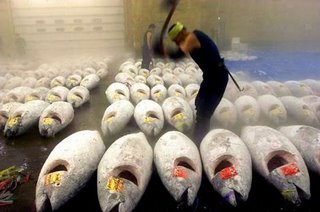15th of August is looming again. The way people gripe and bitch, you'd think Japan won World War II. Anywway, here's an interesting article.
Koreshige Anami, the former Japanese ambassador to China sent a telegram to Prime Minister Koizumi not to go to the Yasukuni Shrine last year. It was a highly irregular missive, which was also ignored.
阿南惟茂(あなみ・これしげ)前駐中国大使が在任中の昨年の終戦記念日を前に、小泉純一郎首相に対して靖国神社参拝を中止するよう要請する公電を打っていたことが11日、関係者の話で分かった。日中関係悪化を憂慮したとみられるが、現職大使がこうした形で首相に意見具申するのは「異例」(外務省幹部)。公電は外務省を通じて首相官邸に届けられたが、小泉首相は10月17日、就任後5回目の参拝に踏み切り、結果として受け入れられなかった。So it turns out Ambassador Anami was advising against the visits during his tenure. He was a proper careerist diplomat after all; not some political appointment in support of agitating China. Interesting.
阿南氏は同省アジア局長などを歴任、対中関係を重視する、いわゆる「チャイナスクール」の筆頭格だが、1945年、ポツダム宣言受諾に反対し自決した故阿南惟幾(あなみ・これちか)陸相の子息としても知られる。惟幾氏は靖国神社に合祀(ごうし)され、阿南氏は「遺族」の立場にもある。
阿南氏は取材に対し、具体的なコメントを避けている。公電を打った日時は明確ではないが、昨年の7月前後とみられる。数枚にわたる長文で(1)中国側にとって2005年は「抗日戦争勝利60周年」という記念すべき年(2)05年前半からデモが頻発するなど中国国民の反日感情が高ぶっている—などを理由に小泉首相に参拝を中止するよう求めている。外務省は小泉首相あてだったため、そのまま首相官邸に伝えた、という。
昨年7月前後は郵政民営化関連法案をめぐる攻防が激化、7月初めの衆院本会議でかろうじて可決。しかし、8月の参院本会議採決で否決の見通しが強まる中、局面打開や有終の美を飾るため、小泉首相が公約である「8・15」参拝を実行するのではないかという見方が広まっていたことも背景にあったと思われる。
阿南氏は今年3月、離任にあたり「靖国問題は政治問題化しており参拝方法を変えても解決しない。参拝するか、しないか、しかない」と、間接的に小泉首相の参拝を批判する趣旨の報告を関係者に行っている。
一方、首相は昨年の参拝後、記者団に対し「心の問題に他人が干渉すべきではない。外国政府がいけないとかいう問題ではない」と述べ、中国などへの不快感を示した。
Meanwhile, it has come to light that Jianng Ze-Min has always been in line to make it Chinese policy to criticise Japan at every turn, 'eternally into the future'. The link is from the Nikkei Newspaper, which is centrist, and even they're not very kind towards this discovery:
「日本に対し、台湾問題は深く徹底的に話さなければならない。歴史問題は終始強調しなくてはならず、永遠に話さなくてはならない」。中国の江沢民前国家主席が1998年、対日政策の基本方針としてこう述べていたことが、10日に売り出された「江沢民文選」で明らかになった。Jiang Ze-Min states that Japan is still miliatristic. I don't know on what grounds he asserts this fiction except for the fact that Japan has some capability to defend herself. As for this expression, 'unsinkable aircraft', it actually does not refer to Taiwan aas Jiang believes, but rather a moniker former PM Nakasone applied to Japan in referring to her security treaty with the USA.
江氏の発言は、同年8月に海外駐在大使らを集めて開いた会議での演説の一節。戦後日本が「軍国主義をいまだ徹底的に清算していない」との認識を示し「警戒しなければならない」と語った。台湾については、まず日本人が「自らの不沈空母」と位置づけ「その衣鉢を米国の一部の人が継いだ」と指摘した。
発言の3カ月後、江氏は中国の国家主席として初めて訪日し、小渕恵三首相(当時)との会談などで「正確な歴史認識」を繰り返し求めた。これに対し日本国内では「中国はいつまで歴史カードを切り続けるのか」といった反発が広がり、その後、日中の政治関係はぎくしゃくしていった
So it seems to me China really is running its Foreign Policy on misunderstanding and a reckless lack of proper assessment. Not that we're surprised by a heavily ideologised country believing in its own propaganda as 'fact'. So onward into the future goes China's rather undiplomatic foreign policy. However it has to be said that it's a real drag both parties are stiffening up over positions that are largely faulty and unfactual.
Then there is this business of 'awareness of history'. It's a phrase that seems to come straight out of the Communist re-education camps. You sort of wonder if Jiang has an awareness of how bizarre this sounds in light of what is understood to be history as documented fact. There seems to be a total lack of epistemology in Chinese political thought. It contrasts starkly with say, Donald Rumsfeld's famous "known unknowns and unknown unknowns" speech. In other words, you get the feeling that they believe that people believe any old stuff that they say because nobody will try to verify or falsify claims.
Of course this is why you need freedom of speech and transparency, neither of which is in abundance in Communist China.
The Day Japan Ate The Whole World' s Tuna Stock

This is far more worrying than the Chinese sabre-rattling.
AUSTRALIA'S top fisheries manager has revealed Japan illegally took $2 billion worth of southern bluefin tuna, effectively killing the stock commercially.Literally, that's a lot of sushi.
An investigation into the imperilled fishery found Japanese fishers and suppliers from other countries caught up to three times the Japanese quota each year for the past 20 years, and hid it.
The Australian Fisheries Management Authority's managing director, Richard McLoughlin, said it was an enormous international fraud. "Essentially the Japanese have stolen $2 billion worth of fish from the international community, and have been sitting in meetings for 15 years saying they are as pure as the driven snow. And it's outrageous."
Mr McLoughlin was speaking at an ANU seminar in a speech recorded and posted on the internet. The official findings of the inquiry were presented at an international meeting in Canberra in July, but remained confidential.
Mr McLoughlin's revelations raised the prospect yesterday that other fisheries in the Pacific and Indian oceans were pilfered. There were also renewed calls for southern bluefin to be protected under international wildlife law.
One of the world's most expensive fish, southern bluefin migrate around the temperate waters of Australia and grow to about 200 kilograms. A $280 million industry is based on catching the fish in the Great Australian Bight and cage-fattening at Port Lincoln.
The Japanese overcatch was uncovered by Australian industry figures who scrutinised publicly available market documents.
One of the main reasons why the Japanese fisheries department fights so hard over the whaling issue is because it sees tuna as the next battleground. Whales, are the thin end of the wedge. Yet common sense tells us that with the depletion of world's fish stocks, sushi prices as they stand in Japan are way too under-priced. More recently, it's become really hard to find tuna in Sushi restaurant in Sydney, reflecting the scarcity and therefore the high prices.

No comments:
Post a Comment